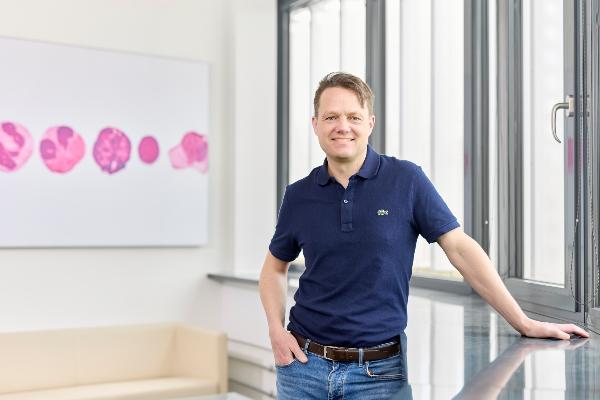Everyone learns about nucleic acids at school. After all, they carry our genetic information. All organisms on Earth use DNA and RNA as letters for the code in which genetic information is stored and read. In humans and other eukaryotes, each cell has a special place where the valuable data is stored in the form of DNA – the cell nucleus. “This is like a reference library, you might say, from which information can be copied as needed,” illustrates Veit Hornung, Chair Professor of Immunobiochemistry at LMU’s Gene Center Munich. The copies from the DNA library consist of another type of nucleic acid: RNA. The RNA molecules are transported out of the cell nucleus into the cytoplasm, where they are translated into proteins. “RNA is the blueprint for assembling a protein from amino acids,” says Hornung.
But RNA is much more than that, as the scientist emphasizes: “We now know that the majority of RNA molecules in the cell have got nothing at all to do with the translation of proteins.” They stabilize the transcripts, for example, to increase their durability, or even carry out tasks that we otherwise associate with enzymes. There is a whole range of such additional nucleic acid functions that go far beyond its role as a storer and conveyor of information.
Big potential for research, medicine, and technology
This discovery has led to a veritable boom in nucleic acid research over the past few decades. The field has taken off not least because researchers recognized the enormous therapeutic and biotechnological potential. Today it is possible to synthetically manufacture RNA and DNA molecules and thus, for example, reprogram certain functions in the cell. The CRISPR/Cas system, which involves combining small RNA molecules with an enzyme and making very precise cuts in the genome, is particularly well known.
Meanwhile, the coronavirus pandemic thrust the development of mRNA vaccines into the focus of public attention – and made a decisive contribution to the global containment of SARS-CoV-2. “Other nucleic acids that are already in therapeutic use are antisense and siRNA molecules,” explains Hornung. “These are small DNA and RNA molecules that are introduced into the cell. They bind to a complementary sequence of mRNA and can degrade these molecules in a targeted manner.”
Prof. Dr. Veit Hornung is one of the spokespersons for the new NUCLEATE Cluster of Excellence.
© LMU / Stephan Höck
But Hornung is convinced that the end of the road is still a long way off. “This research domain will advance in dramatic ways,” he predicts. “In the future, we’ll be able to intervene in the genome with ever greater specificity and precision.” He describes the potential for medical and technological applications as immense. That being said, many questions remain open: For example, how do you convey nucleic-acid-based drugs with precision to the right place in the bodies of patients to enable gene editing in specific cells?
At present, it is possible to extract cells from the body, genetically modify them in the laboratory, and transfer them back again. The ‘holy grail’ of the field, however, is precision genome editing directly in the body – so-called in vivo gene therapies. Initial experimental approaches already exist, and the cluster of excellence is one of the places where researchers will be advancing such technologies.
“With NUCLEATE we’re going to be at the vanguard of exploiting and expanding this potential,” says LMU Professor Veit Hornung. Together with Professor Stefan Engelhardt from the Technical University of Munich (TUM) and Professor Cynthia Sharma from the Julius Maximilian University of Würzburg (JMU), he is part of the spokesperson team for the new cluster of excellence, which brings together the scientific expertise of the three universities.
NUCLEATE should be an engine of innovation and a magnet for new talent. We’re expecting fundamental insights into cell biology – and thus fresh inspirations for the medicine of tomorrow.
Veit Hornung
Yet therapeutic and biotechnological aspects are just one part of the cluster. Basic research is also a big priority at NUCLEATE. Many functions and properties of nucleic acids remain unknown or scarcely investigated. “Naturally, the interface with practice plays an important role, but for us basic research must not necessarily lead directly to applications to be justified,” emphasizes Hornung. “The big breakthroughs of recent decades were driven by scientific curiosity and came from basic research, not applied research.”
A vision for nucleic acid research
The NUCLEATE vision looks at nucleic acids from three perspectives: as a subject, as an object, and as an instrument. In this way, the cluster of excellence wants to cast a fresh eye on the field. Where it is interested in new functions of nucleic acids, it sees the nucleic acids as a subject. Here the nucleic acids are the driving forces behind activity in the cell. The cluster sees nucleic acids as an object when something is done to them in the cell – modification, say, or processing or degradation. And NUCLEATE sees nucleic acids as an instrument when something is to be achieved with them in a therapeutical or technological sense.
A cluster of excellence offers the unique opportunity to risk big leaps – both in researching the foundations and in opening up new areas of application. Nucleic acid research is funded worldwide in larger alliances, but NUCLEATE is the first cluster in this domain in Germany and Europe. This represents a long overdue closing of a gap, as Germany has actually long been in an excellent position as regards nucleic acid biology and corresponding translational research.
The NUCLEATE vision looks at nucleic acids from three perspectives: as a subject, as an object, and as an instrument.
© LMU / Jan Greune
Through NUCLEATE, closer ties will be forged between the individual groups in Munich and Würzburg: “The cluster is extremely interdisciplinary in its makeup. From organic chemistry and biochemistry, to cell biology and microbiology, to medicine and veterinary medicine, we cover almost all areas of natural science,” reckons Hornung. In addition, computer-supported biology plays an important role. The researchers plan to use artificial intelligence to analyze their data and, based on the results, generate models that will allow them in future to predict the behavior of cells.
Concentrated expertise for successful research transfer
As regards the expertise of the three partner universities, LMU is particularly strong in biochemistry and structural biology – the molecular foundations of nucleic acid research. Meanwhile, TUM’s fortes are translation into therapy, organismic models, animal models, and patient-related aspects. As for JMU, it has particular expertise in infection biology and the nucleic acid biology of pathogens.
“These are three truly outstanding profiles, not only at a German level but worldwide, that we’re bringing together here,” says Hornung with satisfaction. In addition, there are numerous cutting-edge biotech companies in the NUCLEATE ecosphere. “Moreover, we’ve already founded some businesses out of our scientific milieu,” he explains. “As such, we’re very well connected to biotechnology and industry when it comes to bringing our research to application.”
Major achievement for LMU: seven Clusters of Excellence approved
Read more
A freshly conceived master’s program will further connect the three locations. Students will rotate through the respective laboratories, spread know-how, and contribute to interconnecting the research groups with each other. In this way, NUCLEATE creates bottom-up links between the various groups. “There are already many synergies between the individual locations and disciplines, which we’re now specifically planning to further foster. To this end, we will be recruiting new professors and research group leaders who connect topics and methods across the locations.”
Within the next few years, the researchers want to make NUCLEATE the leading center for nucleic acid research in Europe. Veit Hornung describes the goal in a nutshell: “NUCLEATE should be an engine of innovation and a magnet for new talent. We’re expecting fundamental insights into cell biology – and thus fresh inspirations for the medicine of tomorrow.”


